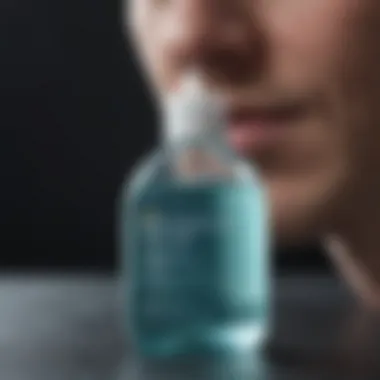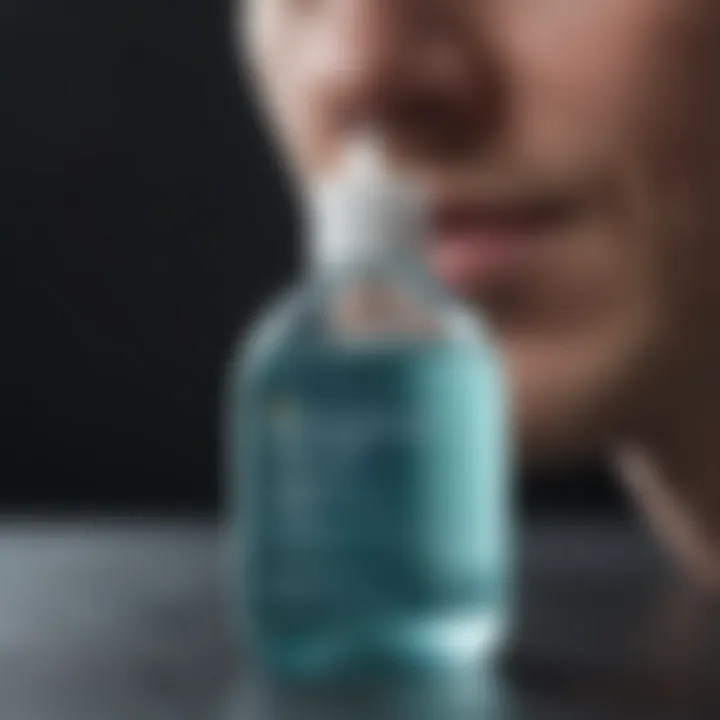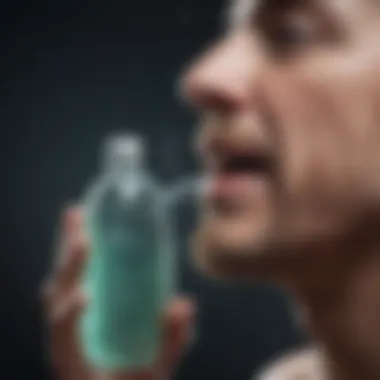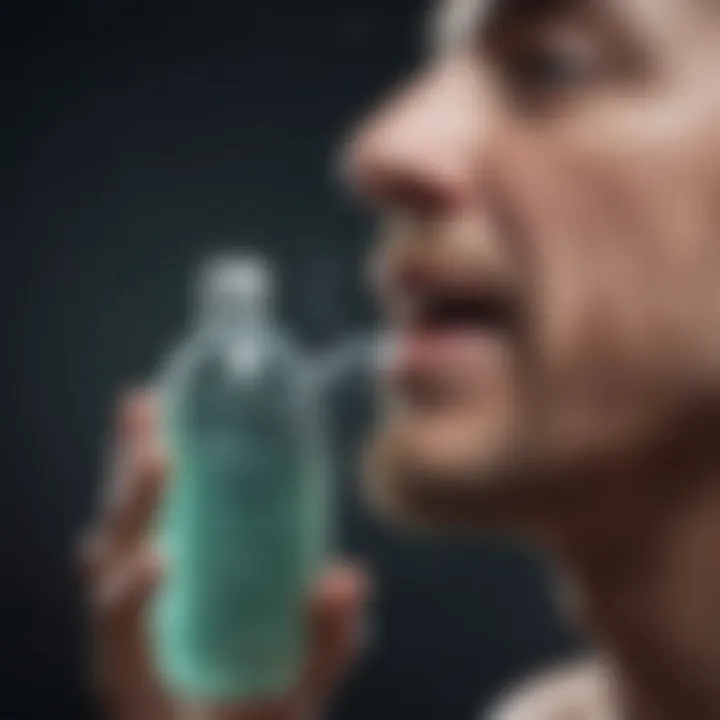Exploring Mouthwash as a Dandruff Solution


Intro
Dandruff is a common issue that many people face. The condition, characterized by flaky and sometimes itchy scalp, can be uncomfortable and embarrassing. Many treatments are available, but their effectiveness varies greatly. Recently, a rather unconventional solution has emerged: mouthwash. This raises an important question: can mouthwash be an effective remedy for dandruff? This exploration aims to uncover the relationship between mouthwash and dandruff treatment.
Research Overview
This section provides a foundational understanding of the relationship between mouthwash ingredients and dandruff symptoms.
Summary of Key Findings
Research indicates that certain active ingredients in mouthwash, such as chlorhexidine, cetylpyridinium chloride, and alcohol, possess antimicrobial properties. These components are crucial in combating the Malassezia fungus, often associated with dandruff. Studies suggest that using mouthwash on the scalp may reduce the severity of dandruff symptoms. Another key finding is that the anti-inflammatory properties of some mouthwash ingredients can soothe scalp irritation, a common complaint for affected individuals.
Importance of the Research
Understanding the potential use of mouthwash for dandruff treatment can open new avenues for individuals seeking alternatives to traditional anti-dandruff shampoos. Additionally, it can encourage further research into unconventional remedies for scalp health, diversifying the current treatment landscape.
Methodology
This section outlines how research was conducted to draw meaningful conclusions about mouthwash and dandruff.
Study Design
The research involved analyzing existing studies that examined the efficacy of mouthwash in treating dandruff. The focus was on peer-reviewed articles that specifically discussed active ingredients in mouthwash and their effects on scalp health.
Data Collection Techniques
Data collection involved reviewing literature from medical journals, dermatological studies, and online forums where users shared personal experiences. This multi-faceted approach provided a comprehensive view of the issue, taking into account scientific evidence as well as anecdotal feedback.
Dandruff can significantly affect quality of life. Exploring alternative treatments like mouthwash offers hope to those looking for relief.
This overview serves as a basis for a deeper investigation into the effectiveness and risks associated with using mouthwash for dandruff treatment. More detailed information about the science behind dandruff and mouthwash will follow.
Understanding Dandruff
Dandruff is a common scalp condition affecting many individuals. It is characterized by flaking skin on the scalp, which can lead to embarrassment and discomfort. Understanding dandruff is crucial for several reasons. Firstly, it allows individuals to differentiate between regular flaking and more severe scalp issues. Knowledge of its nature helps in selecting appropriate treatments, whether they are over-the-counter or home remedies.
Additionally, understanding the underlying causes of dandruff provides insights into prevention strategies. For example, factors like dry skin, oily skin, or yeast overgrowth can all contribute to this annoying condition. By gaining a deeper understanding of dandruff, individuals can tailor their approach and avoid common pitfalls in treatment.
What is Dandruff?
Dandruff refers to the shedding of dead skin cells from the scalp, often appearing as white or yellow flakes in the hair. This condition can vary in severity, from subtle signs of flaking to notable scaling and irritation. Most people experience dandruff at some point in their lives, and it tends to occur more frequently in teenagers and young adults. The condition is not contagious, making it a personal concern rather than a public health issue.
Many people associate dandruff with dry skin or poor hygiene, but the reality is more complex. While these factors can exacerbate the issue, dandruff often stems from an overgrowth of a yeast-like fungus called Malassezia, which feeds on the oils on the scalp. This process can cause inflammation, leading to rapid skin cell turnover and, ultimately, dandruff.


Causes of Dandruff
Several factors contribute to the causes of dandruff. Some of the key causes include:
- Dry Skin: This is often referred to as seasonal dandruff and can worsen during winter months when humidity is low.
- Oily Skin: Excess oil can promote the growth of Malassezia, resulting in dandruff and a greasy scalp.
- Fungal Growth: As mentioned, Malassezia plays a central role. When it overgrows, it can trigger an inflammatory response in the scalp.
- Skin Conditions: Conditions like seborrheic dermatitis or psoriasis can cause severe dandruff and require specialized treatment.
- Sensitivity to Hair Products: Certain hair products can irritate the scalp, leading to flaky skin.
Understanding these causes can help in developing effective strategies to manage or prevent dandruff.
Symptoms of Dandruff
Recognizing the symptoms of dandruff is essential for effective management. The primary symptom is the presence of flakes that may appear in the hair and on the shoulders. Other common symptoms include:
- Itching: The scalp may feel itchy or irritated, leading to scratching, which can worsen flaking.
- Redness: In some cases, the scalp may become red or inflamed due to irritation.
- Dry or Oily Scalp: Depending on the type of dandruff, the scalp may feel dry or excessively oily.
If symptoms persist or worsen, it may indicate an underlying health issue that requires professional attention. Recognizing these signs early enables individuals to seek appropriate treatment and alleviate discomfort.
Preamble to Mouthwash
Mouthwash is a commonly used oral hygiene product. It traditionally serves to freshen breath and reduce plaque. However, its potential applications may extend beyond dental care. This section will explore mouthwash's ingredients, properties, and how they might relate to dandruff treatment.
Common Ingredients in Mouthwash
Mouthwash is formulated with a variety of ingredients. These often include:
- Alcohol: Often used as an antiseptic. It helps kill bacteria in the mouth but may cause dryness if overused.
- Chlorhexidine: This is a powerful antiseptic effective against a wide range of bacteria, aiding in gum health.
- Cetylpyridinium Chloride: This compound has antibacterial properties, making it effective in reducing plaque and controlling bad breath.
- Fluoride: Essential for preventing tooth decay, its role in mouthwash complements its anti-cavity benefits.
- Essential Oils: Common oils like menthol and eucalyptus may provide a refreshing taste and additional antibacterial properties.
These ingredients are designed primarily for oral health; however, their properties might hold relevance for scalp care. Understanding these components can provide insight into their theoretical effectiveness against dandruff.
Antiseptic Properties
The antiseptic properties of mouthwash are notable. Ingredients such as chlorhexidine and alcohol work effectively to inhibit bacterial growth in the mouth. This action might suggest a similar effectiveness against scalp conditions like dandruff, which can also involve fungal elements.
"The antiseptic qualities of specific mouthwash components might provide a surprising avenue for treating scalp issues."
Research indicates that fighting microorganisms on the scalp may help alleviate dandruff symptoms. Antiseptic properties could contribute to maintaining a healthy scalp environment, which is crucial for minimizing flaking and irritation.
This section sets the foundation for further exploration into how mouthwash might function as a treatment for dandruff through its antiseptic capabilities and ingredient characteristics.
Theoretical Mechanisms
Understanding the theoretical mechanisms behind how mouthwash could potentially aid in dandruff treatment is critical to assessing its viability. Here, we delve into two significant aspects: how mouthwash might positively influence scalp health and its potential role in addressing fungal growth, which is often linked to dandruff.
How Mouthwash Might Affect Scalp Health


Mouthwash contains various active ingredients, such as chlorhexidine, cetylpyridinium chloride, and essential oils. These components are designed to reduce microbial load in the mouth, but their application to scalp health is worth exploring.
The scalp, like the mouth, hosts a diverse array of microorganisms. A balance between beneficial and harmful bacteria is essential for maintaining healthy skin. A disrupted microbiome may lead to conditions such as dandruff. A few key points emerge from existing research regarding the influence of mouthwash on scalp health:
- Antimicrobial Effects: Mouthwash's antiseptic properties may help reduce scalp irritation and inflammation, contributing to the alleviation of dandruff symptoms.
- pH Balance: Some mouthwashes are formulated to maintain a certain pH level. A balanced pH can promote a healthier scalp environment, potentially helping to mitigate dandruff.
- Promoting Scalp Circulation: The sensation from using mouthwash on the scalp could stimulate blood flow, possibly providing more oxygen and nutrients to hair follicles. This stimulation may indirectly support healthier hair growth and scalp condition.
While these mechanisms are promising, individual responses may vary, and further studies are needed to draw definitive conclusions on the efficacy of mouthwash when used on the scalp.
Potential Impact on Fungal Growth
Fungal growth is often implicated in the development of dandruff, with Malassezia furfur being one of the most common fungi found on the scalp. This organism thrives on the natural oils of the scalp and can lead to inflammation and flaking when present in excess. Mouthwash might have several potential impacts on this fungus:
- Direct Antifungal Properties: Some ingredients in mouthwash, particularly those that are antifungal in nature, can directly inhibit the growth of Malassezia furfur. For example, chlorhexidine has demonstrated antifungal activity in various settings and might contribute to a reduction in fungal populations when applied to the scalp.
- Disruption of Biofilms: Fungi can form protective biofilms, making them more resistant to conventional treatments. Mouthwash can disrupt these biofilms, allowing for better penetration of antifungal agents, whether they come from medicated shampoos or other sources.
- Reducing Surface Lipids: Certain mouthwash formulations may help in breaking down excess oils on the scalp. Reducing these lipids could lessen the nourishment available to fungi, thereby controlling their proliferation.
While the impact of mouthwash on fungal growth shows promise, proper usage and consultation with healthcare professionals are advised to avoid adverse effects and ensure effective treatment of dandruff.
Research Review
The exploration of the link between mouthwash and dandruff requires a careful examination of existing research. Understanding the current literature is key to grasping whether mouthwash can indeed offer a solution for those suffering from dandruff. This section focuses on specific studies and their relevance, as well as the implications these findings have for individuals seeking alternative remedies.
Research in this area can provide insights into the potential effectiveness of mouthwash as a treatment. It also highlights the limitations inherent in these studies, emphasizing the need for critical evaluation. This review is significant not just for academic interest, but also for practical understanding. A rigorous analysis of research can help formulate strategies for treating dandruff more effectively.
Studies on Mouthwash and Dandruff
Multiple studies have attempted to investigate the hypothesized benefits of mouthwash in treating dandruff. Some of these studies have focused on the antifungal properties of ingredients found in various mouthwashes, such as chlorhexidine and cetylpyridinium chloride. These components are known for their ability to inhibit the growth of fungi, which is a primary contributor to dandruff.
Interestingly, one study indicated that regular application of an antiseptic mouthwash could potentially reduce scalp flakiness, although further research is required for conclusive evidence. Despite these anticipations, results often differ depending on the formulation of the mouthwash.
Clinical Evidence Supporting the Use of Mouthwash
Clinical evidence regarding the use of mouthwash for treating dandruff remains scarce. A few anecdotal reports suggest that individuals have experienced relief after using mouthwash on their scalp. However, controlled clinical trials are limited. Some dermatologists advise caution due to the unknown long-term effects of using mouthwash on the scalp.
It is also crucial to compare the concentrations of active ingredients in mouthwash with those found in specialized anti-dandruff shampoos. The formulation differences may explain why mouthwash has not been categorically endorsed in clinical practice for scalp conditions.
In summary, while some studies show promise in the antifungal properties of mouthwash, the lack of robust clinical trials limits conclusive endorsement. Individuals considering this method should do so judiciously, weighing potential benefits against possible risks.
Alternative Treatments for Dandruff
Exploring alternative treatments for dandruff is crucial in providing individuals with a range of options to manage this condition effectively. While it's common to default to traditional antifungal shampoos, many people seek alternatives due to personal preferences, sensitivities, or ineffectiveness of standard treatments. The diversity in alternative treatments reflects the importance of personalizing care.
The goal is to alleviate itching, flaking, and irritation that comes with dandruff. Furthermore, understanding these treatments can empower individuals to make informed decisions and consider what aligns best with their lifestyle and skin type. Different methods can be beneficial both individually and in combination, thus allowing tailored solutions depending on one's specific symptoms and challenges.
Over-the-Counter Solutions


Over-the-counter (OTC) solutions offer practical and accessible ways to manage dandruff. These products often contain active ingredients that help reduce the flakes and soothe the scalp. Popular options include:
- Pyrithione zinc: Known for its antifungal properties, this ingredient combats the microorganisms contributing to dandruff.
- Salicylic acid: This ingredient exfoliates the scalp, helping to remove dead skin cells and excess oil.
- Ketoconazole: A broad-spectrum antifungal, it tackles the fungal causes of dandruff effectively.
- Coal tar: This traditional remedy works by slowing down the production of skin cells on the scalp.
Individuals may find one solution more effective than others, suggesting a trial-and-error approach can be useful. Consulting with a healthcare professional can also guide the choice of an appropriate product based on specific symptoms.
Natural Remedies
For those inclined towards more natural remedies, several alternatives exist that may provide relief from dandruff. Natural solutions can be gentle on the scalp and have fewer side effects compared to conventional treatments. Some commonly used natural remedies include:
- Tea tree oil: Having antifungal properties, tea tree oil can be applied mixed with carrier oils to help soothe the scalp.
- Apple cider vinegar: This ingredient can help balance the scalp's pH, potentially reducing the growth of yeast.
- Aloe vera: Renowned for its soothing properties, aloe vera can hydrate the scalp and alleviate irritation.
- Coconut oil: This natural oil moisturizes the scalp and has antifungal effects, making it a popular choice for dandruff management.
While many people report success with these natural remedies, scientific backing can vary. It is vital to monitor the scalp's reaction and adjust the approach if any irritation arises.
Risks and Considerations
When exploring unconventional remedies, such as using mouthwash for dandruff, it is crucial to consider potential risks and side effects. Understanding these factors not only ensures safety but also helps in making informed decisions regarding treatment options. This section provides insights on why it is essential to assess the risks associated with using mouthwash on the scalp, considering the delicate nature of scalp health and the possible implications for overall skin integrity.
Side Effects of Using Mouthwash on Scalp
Mouthwash is formulated for oral hygiene, and its application on the scalp may lead to unintended side effects. The active ingredients in mouthwashes, particularly alcohol and other potent antiseptic components, can cause irritation when applied to sensitive scalp skin. Possible side effects include:
- Dryness: Mouthwash can strip natural oils, leading to a parched scalp.
- Itching and Redness: Antiseptic agents may create discomfort or allergic reactions.
- Flaking: Ironically, using mouthwash could exacerbate dandruff for some individuals, causing more flakes rather than less.
Research indicates that while some individuals may find relief, others might suffer from adverse reactions. Therefore, conducting a patch test prior to full application is prudent.
Skin Sensitivity and Reactions
Skin sensitivity varies among individuals, and this plays a significant role when considering unconventional treatments. Many people have differing tolerance levels to various cosmetic products. Mouthwash's strong formulation can lead to skin reactions, including:
- Contact Dermatitis: Some users may experience localized rashes.
- Stinging Sensation: The burning feeling may occur upon application, indicating a reaction to the ingredients.
- Inflammation: Prolonged use could lead to worsening of symptoms, creating a cycle of irritation.
It's important to note that the scalp is not always treated with the same care as facial skin. Thus, using mouthwash can be questionable, particularly for those with pre-existing skin conditions like eczema or psoriasis. Keeping an eye on any changes after application is vital to ensure scalp health is not compromised.
Finale
Understanding the relationship between mouthwash and dandruff treatment is an important area of discussion for those seeking effective solutions to scalp issues. This article has delved into various facets of the topic, aiming to clarify the potential for mouthwash as a remedy. By exploring both the scientific principles involved and the practical implications of using mouthwash, we highlight the complexity of dandruff management.
Summary of Findings
The research indicates that certain properties of mouthwash, particularly the antiseptic ingredients, may have some effect on dandruff. For instance, ingredients such as cetylpyridinium chloride and essential oils might inhibit the growth of fungi associated with dandruff. However, the supporting evidence remains limited and often circumstantial.
Moreover, clinical studies have not strongly affirmed mouthwash as a primary treatment for dandruff. Many individuals report a degree of symptom relief, but this varies from person to person.
Overall, while mouthwash is not a conventional treatment for dandruff, its use may provide temporary relief for some. It is essential, however, to approach this remedy with caution and to consider scientific guidance.
Final Recommendations for Dandruff Management
For effective dandruff management, individuals should consider the following recommendations:
- Consult a Dermatologist: Before trying any new treatment, it’s recommended to consult a healthcare professional for personalized advice.
- Explore Conventional Treatments: Over-the-counter remedies such as shampoos containing zinc pyrithione or ketoconazole are backed by better research.
- Patch Test Any New Treatment: If optting for mouthwash or any unconventional treatment, always perform a patch test to avoid adverse reactions.
- Maintaining Scalp Hygiene: Regular washing of hair and scalp can help reduce the build-up of skin cells and sebum, which contribute to dandruff.
- Implement a Healthy Diet: Nutritional choices may also affect scalp health, so include vitamins and minerals that promote skin health in your diet.



